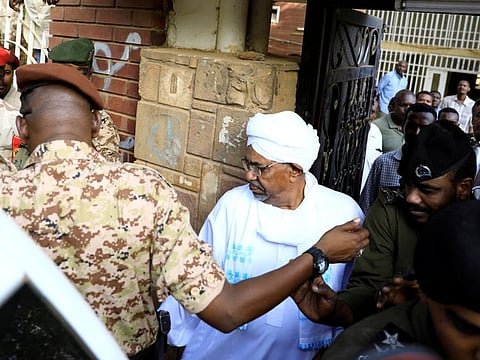Sudan’s Bashir appears in public for first time since ouster
Former Sudanese president was questioned over accusations that include money laundering

Khartoum: Sudan’s former President Omar al-Bashir appeared in public for the first time since his ouster two months ago, as he was led to a prosecutor’s office Sunday in a corruption investigation.
The deposed strongman has been held under arrest in the capital, Khartoum, since the military removed him from power in April amid mass protests against his 30-year rule. The military has since been locked in a tense standoff with the protest movement demanding civilian rule, even as it has promised reforms and held on-again, off-again talks with opposition leaders.
A judicial official with the prosecutor’s office said al-Bashir was questioned over accusations that include money laundering and the possession of large amounts of foreign currency.
He said the probe partly related to millions of dollars’ worth of cash in U.S. dollars, euros and Sudanese pounds that were found in al-Bashir’s home a week after his ouster.
A spokesman with the military’s media office confirmed that this is the first time the former president was taken out from his prison in Khartoum.
Both officials spoke on condition of anonymity because they were not authorized to talk about ongoing investigations.
On Sunday, al-Bashir was led from prison to a Toyota Land Cruiser, wearing a traditional white robe and turban.
The official SUNA news agency quoted a police spokesman as saying al-Bashir’s defense lawyers attended the questioning and he returned to prison afterward.
Al-Bashir has the right to appeal within a week, SUNA reported.
In May, al-Bashir was charged with involvement in killing protesters and incitement to kill protesters during the popular uprising that started in December, initially over price increases of basic goods and a failing economy, but which later turned into calls for his ouster. The military toppled him on April 11.
Al-Bashir is also wanted by the International Criminal Court over charges of war crimes and genocide linked to the Darfur conflict in the 2000s, but the military has said it would not extradite him to The Hague. He was the only sitting head of state for whom an international arrest warrant has been issued.
Meanwhile, the deputy head of Sudan’s ruling military council pushed back Sunday against demands from protest leaders concerning the composition of a transitional legislative body.
Gen. Mohammed Hamdan Dagalo said a legislative body formed with a majority from protest movement leaders, who seek civilian rule, is a problem because it is not formed by elections. He said that “our problem is a non-elected legislative body which would root out all of us.”
This would suggest a reversal to previous deals between the military and protest leaders, which included a three-year transition period, a Cabinet appointed by the protester leaders, and a legislative body with a civilian majority.
Dagalo also said those responsible for the bloody break-up of the protesters’ sit-in outside the military’s headquarters in Khartoum on June 3 would be given the death sentence.
“We are working hard to take those who did this to the gallows,” he said.
The ruling generals have said several military officers are in custody for alleged “deviation” from the action plan set by their leaders to clear a problematic area, known as Colombia, near the sit-in area.
Protest organizers say more than 100 people were killed and hundreds were wounded during the razing of the camp and the subsequent clampdown by the security forces. The military-backed authorities say 61 people died, including three members of the security forces.
Dagalo’s comments on the legislative body came less than a week after an Ethiopian envoy to Sudan said that all previous deals between the generals and protest leaders, despite the break in talks earlier this month, have been restored.
Mohammed Yousef al-Mustafa, a spokesman for the Sudanese Professionals Association which has led the protests, told The Associated Press that they expected the military council to withdraw the deal on the legislative body.
“Dagalo’s comments were serious indication that the council wouldn’t stick to the previous deals despite the Ethiopian mediation,” he said.
He said the agreement on the legislative body was the most important victory for the protesters.
“The government will be paralyzed without a legislative body supporting its agenda,” he said.
The Arab League chief, Ahmed Aboul Gheit, arrived in Khartoum on Sunday to meet with both sides.
Aboul Gheit told reporters that he had met with the head of the military council, Gen. Abdel-Fattah Burhan, to discuss ways to break the political impasse.



